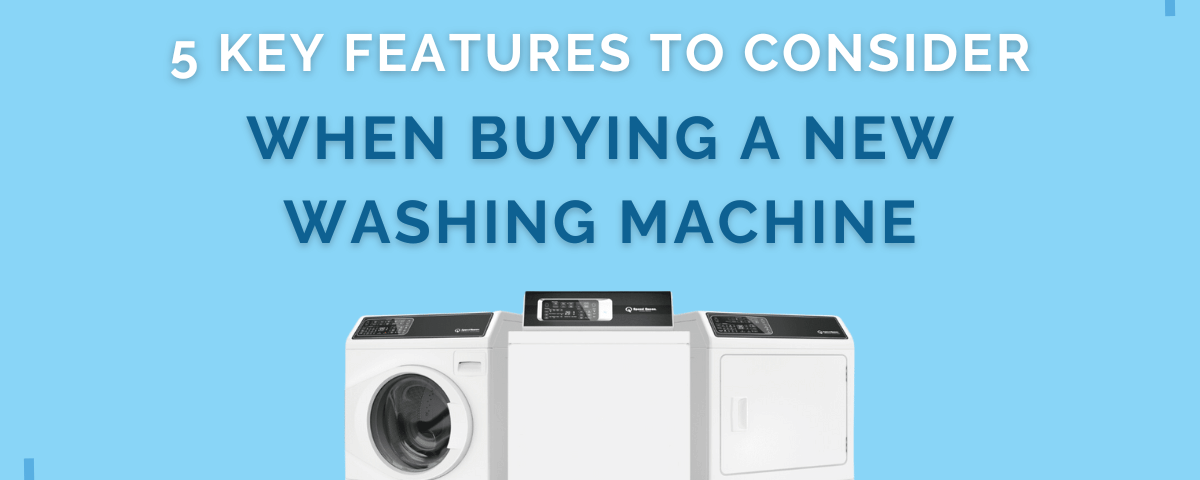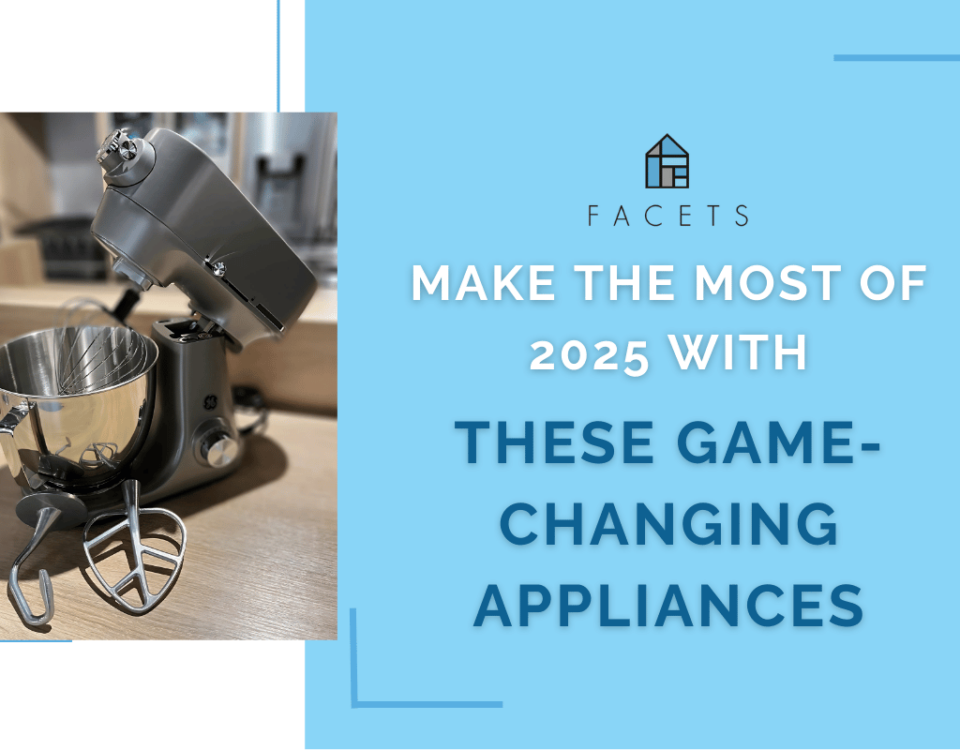
Nugget vs. Cubed Ice Machines: How to Choose the Right One
October 29, 2024
Make the Most of 2025 with These Game-Changing Appliances
December 27, 2024If you’re in the market for a new washing machine, you’re probably feeling a bit overwhelmed. With so many brands, models, and features to choose from, it can be tough to know where to start. After all, a washing machine is an investment, and making the right choice is important for both your budget and your laundry routine.
Choosing a new washing machine isn’t something you do every day, so it’s understandable if you’re unsure where to begin. That’s why we’re here to help you break it down and focus on the features that really matter. We’ll walk you through the top features to look for, helping you find the perfect washing machine for your home in Lafayette.
Front Load vs. Top Load
When it comes to choosing a new washing machine, one of the first decisions you’ll need to make is whether to go with a front load or a top load design. Both types have their own set of advantages and drawbacks, so understanding the differences can help you find the best fit for your home, budget, and laundry needs.
Front Load Washing Machines: Efficient, Space-Saving, and Gentle on Clothes
Front load washing machines have gained popularity over the years for good reason. They tend to deliver better cleaning results, especially for heavily soiled clothes, because they use a tumbling action that’s gentler on fabrics. If you’re tight on space, a front load machine might be a good choice, since many models can be stacked with a dryer, saving valuable floor space.
In terms of water and energy efficiency, front load machines typically outshine their top load counterparts. They use less water by tumbling clothes through the water rather than fully submerging them, and they also require less detergent.
However, there are a couple of downsides. Front load washing machines can sometimes be more prone to mold and mildew buildup, especially in the rubber gasket around the door. They also tend to have longer wash cycles, which could be a dealbreaker if you’re short on time.
Top Load Washing Machines: Reliable and Easy to Use
On the other hand, top load washing machines are often considered more reliable and easier to repair. They’re also a bit easier to clean since there’s no door seal to maintain, which is something to keep in mind if you’re looking for a low-maintenance option. Top load washers typically have shorter wash cycles, which is great when you need to get your laundry done quickly.
One of the big perks of a top load washing machine is the ability to add clothes midway through the cycle. If you forget to toss in a shirt or two, you can just open the lid and add them in. These machines are also usually more affordable upfront.
However, they do come with some trade-offs. Top load washers can be noisier during operation and tend to use more water than front load machines, though there are newer models designed to be more water-efficient.
They also aren’t as gentle on clothes as front loaders, so they may cause more wear and tear over time. And, since they can’t be stacked with dryers, top load washers generally take up more space than front loaders.
Washer/Dryer Combo vs. Separate Machines
Another decision to consider is whether to go for a washer/dryer combo or opt for separate machines. While both options have their pros and cons, it really comes down to your space, lifestyle, and how much laundry you typically do.
Washer/Dryer Combo: All-in-One Convenience
A washer/dryer combo is an all-in-one appliance that lets you wash and dry your clothes in the same machine. It’s a great solution for smaller homes or apartments where space is limited. Instead of needing separate units for washing and drying, you can do everything in one machine, making it incredibly convenient, especially if you don’t have a dedicated laundry room.
These combo units are often all-electric, which means they don’t require gas hookups. While that’s great for safety and installation, it also means that drying clothes in a washer/dryer combo generally takes a bit longer compared to a standard dryer. So, if you’re in a rush to get clothes dried quickly, this might be something to consider.
Another point to note is that, while washer/dryer combos are perfect for compact spaces, they tend to have a smaller capacity than separate machines. This can be a downside if you have a large family or if you do laundry in big batches. But for a single person or a couple, they’re an excellent choice that saves both time and space.
Separate Washer and Dryer: Traditional, Efficient, and Fast
On the other hand, choosing a separate washing machine and dryer offers more flexibility. You can pick a washing machine and dryer that best suits your needs in terms of capacity, energy efficiency, and drying speed. Drying times are typically much faster with a traditional dryer, especially if you have a gas-powered model.
The downside of separate machines is the space they take up. If you’re short on room, you’ll need to get creative about fitting both appliances. You might also face a higher upfront cost since you’re purchasing two machines instead of one. However, if you regularly do large loads of laundry or need faster drying times, separate units may be a better fit for your lifestyle.
Capacity
Capacity refers to the amount of space inside the drum—the larger the capacity, the more laundry you can wash in a single cycle. But how do you know what size is right for you?
The right washing machine capacity largely depends on the size of your household and how often you do laundry. If you have a larger family or tend to accumulate a lot of laundry throughout the week, you’ll likely need a washing machine with a bigger drum. On the other hand, if you’re in a smaller household or don’t mind doing smaller loads more frequently, a standard size washing machine will probably be sufficient.
The Different Capacity Categories
Washing machines typically come in three main categories based on their capacity:
- Compact washers (under 4 cubic feet): These are great for small apartments or households with only one or two people. They take up less space and are perfect for lighter loads, but they’re not ideal if you have a lot of laundry to do.
- Standard washers (4-4.5 cubic feet): This is the most common size for households of 2-4 people. They can handle a decent-sized load—regular laundry, a few towels, or even a set of bed sheets without problem.
- Large washers (more than 4.5 cubic feet): If you have a larger family or frequently wash bulky items like comforters, blankets, or heavy-duty clothes, a large-capacity washing machine might be the best choice. These machines can handle bigger loads in a single cycle, saving you time and energy in the long run.
If you’re working with limited space, keep in mind that larger washing machines will need more room in your laundry area. It’s worth measuring the space where you plan to put the washing machine to ensure that you have enough room to accommodate a larger unit. If space is tight, you might be better off choosing a standard or compact model, as these machines take up less room and are still efficient for most households.
Smart Connectivity
In today’s world, everything from your coffee maker to your thermostat can be connected to your phone or smart home devices. And yes, that includes washing machines! Some newer washing machines come with smart features like Wi-Fi connectivity, or the ability to sync with Alexa or Google Assistant. But is this something you really need? Let’s break it down.
A washing machine with smart connectivity lets you control and monitor it remotely, usually through an app on your smartphone. With this feature, you can start, pause, or schedule washes from anywhere.
For example, if you’re out running errands and realize you forgot to start the laundry, you can just open the app, start the machine, and have your laundry ready by the time you get home.
Smart washing machines can also send you alerts. If something’s wrong, like an issue with the water flow or a cycle delay, you’ll get a notification on your phone so you can troubleshoot before it becomes a bigger problem. Some models can even suggest the right wash cycle based on the type of laundry you’re doing, or adjust settings for optimal efficiency.
Is It Worth the Extra Cost?
While smart features can certainly make life more convenient, it’s important to weigh the benefits against the cost. Washing machines with smart connectivity tend to be more expensive than their basic counterparts.
If you’re looking to stick to a budget, you may want to pass on these features. However, if you love the idea of controlling your laundry remotely or enjoy integrating all your home devices, a smart washing machine could be a great addition to your home.
Noise
When shopping for a new washing machine, one often overlooked factor is noise. The sound your washing machine makes during a cycle can really impact your day-to-day life, especially if it’s located near living spaces like the bedroom or living room.
Where Will You Place Your Washing Machine?
Think about where you’ll be placing your new washing machine. If your laundry area is tucked away in a basement or garage, noise might not be much of an issue. But if your washing machine will be placed near your living room, kitchen, or bedroom, it’s something to consider. A noisy machine can become an unwanted background hum while you’re watching TV, cooking dinner, or trying to relax.
If you can’t hide your washing machine away in a quiet space, it’s worth looking for models designed to be quieter. Modern washing machines are built with noise reduction in mind, so there are plenty of quieter options out there, especially in higher-end models.
When choosing a quieter washing machine, be sure to check its vibration and sound ratings. Some machines are equipped with features like vibration reduction systems and insulated drum designs to minimize noise while they spin. Another thing to keep in mind is the type of washing machine. Front-load washers, for example, tend to be quieter than top-load models due to their design and the way they agitate clothes.
Find the Perfect Washing Machine for Your Home
Now that you know the top features to look for when shopping for a new washing machine, you’re ready to make an informed decision.
If you’re in Lafayette, LA, and looking for a reliable washer or dryer, we’ve got you covered. Visit Facets of Lafayette, your trusted home appliance store in Lafayette, where we offer a wide selection of high-quality washing machines from Speed Queen Laundry. Known for its durability, excellent performance, and ease of use, Speed Queen machines are built to last and will help make laundry day a little less stressful.
Ready to find the washing machine that’s just right for you? Book an appointment with one of our Showroom Consultants today, and we’ll guide you through the process. We’re here to help you find the best washing machine that fits your needs, space, and budget. Stop by Facets of Lafayette and see why we’re Lafayette’s go-to home appliance store!



